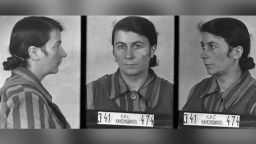The German parliament for the first time on Friday focused its annual Holocaust memorial commemorations on people persecuted and killed over their sexual or gender identity during World War II.
Campaigners in Germany have worked for decades to establish an official ceremony to commemorate the LGBTQ victims persecuted under the Nazi regime.
“Today’s hour of remembrances focuses on a group of victims which had to fight for a long time to achieve recognition: people who were persecuted by the National Socialists because of their sexual orientation or their gender identity,” Baerbel Bas, president of the Bundestag lower house, said while opening a ceremony marking International Holocaust Remembrance Day, the anniversary of Auschwitz’s liberation.
Section 175 of the German penal code had made sexual intercourse between men punishable by imprisonment. The section was dropped from the penal code in East Germany in 1968, whereas in West Germany it reverted to the pre-Nazi era version in 1969 and was only fully abolished in 1994.
“Kisses, touching – even glances became punishable by law. Tens of thousands were accused of homosexuality. This alone was often enough to ruin their social life and existence,” Bass said during the sombre commemoration.
“More than half of these men were convicted, usually to serve long prison sentences or forced labor. In some cases, men were forced to undergo sterilization. Many were driven to suicide,” she added.
The Bundestag president said that while mostly gay men were affected, “lesbian women were by no means safe from persecution. Neither were people who could not or did not want to live as the gender society demanded of them.”
“Those who did not conform to National Socialist norms, lived in fear and mistrust. The hardest hit were the many thousands of men and women who were deported to concentration camps because of their sexuality – usually under a pretext. Many were abused for medical experiments, most perished after only a short time or they were murdered,” she added.
‘Symbol of recognition’
Germany’s Lesbian and Gay Association rights group welcomed Friday’s ceremony, calling it an “important symbol of recognition” of “the suffering and the dignity of the imprisoned, tortured and murdered victims.”
Some members of Germany’s LGBTQ community attended the event in parliament.
Klaus Schirdewahn, who was convicted in 1964 over a sexual relationship with another man under a Nazi-era law, told German lawmakers that he was found “guilty for my feelings for another man, guilty of having violated 175 of the penal code.”
“And it was not until the year 2017 that the guilty verdicts were overturned – including the one against me,” Schirdewahn told the chamber.
“I know that many people from the queer community have had experiences similar to mine – many people like me have lived in hiding for many decades and still do so,” Schirdewahn said. He urged parliament not to forget history, “especially today when the queer community again is facing hostility worldwide – but also in Germany.”
“It is important to me that young people do not forget the effort and strength it took for us to be able to live the way we are allowed to live now.”
The commemoration was attended by German President Frank-Walter Steinmeier, Chancellor Olaf Scholz and two visiting members from Ukraine’s Jewish community.
Scholz on Friday recalled Germany’s historical responsibility for the murder of millions of Jews during the Nazi era.
“The suffering of 6 million innocently murdered Jews is unforgotten – as is the suffering of the survivors,” Scholz wrote on Twitter.


